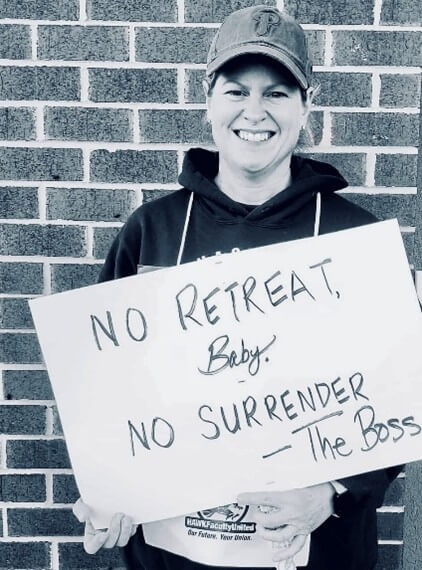We at the Bruce Springsteen Archives & Center for American Music are always interested in the ways that Bruce’s lyrics inspire people in their everyday lives. In this guest blog, Kathleen Rice, PhD, examines how striking faculty at her college have embraced Springsteen songs to sustain them on the picket line.
Springsteen fans around the world know the power of a good sign. For decades, requests scrawled on posterboard have served as ways for fans to connect during shows, and if they’re lucky, inspiration for Bruce himself. As a professor of English, I hope to fill my syllabi with inspiration: signs that speak to students when they feel lost in an endless sea of faces. When designing a course, I choose works from writers such as Toni Morrison, Alberto Ríos, and Louise Erdrich that inspire connection, recognition, skepticism, and discussion centering on change. Springsteen songs have always been an important part of that conversation. Thoughtful and diverse, the students in my classes come from urban and rural areas, with their own hopes and struggles, grasping for their chance at “A Runaway American Dream.” They need to know that their lives are important and their struggles recognized, just as Springsteen fans have understood when the universe seems to bring them the exact song they need at precisely the right time.
Recently, students at HACC, Central Pennsylvania’s Community College, have experienced a disruption in the continuity of their education as faculty members have been forced to strike after teaching for 42 months without a contract. While other college employees received raises during this time, faculty members were penalized for exercising our constitutional right to unionize, without seeing a minimum cost of living increase during this time. Most important, we have had to fight for basic rights, such as control of intellectual property, methods, and modes of instruction: policies that already exist in status quo, and over which faculty must have input, according to the college’s accrediting agency. With all of this, the school wants faculty to surrender all grievance rights, effectively silencing our voices.
When I teach Springsteen as literature in my classes, we always begin with voice. Springsteen’s lyrics capture those of the poor, the restless, the grieving, and the lost. These words connect with community college students, many of whom have full-time jobs, families to support, and bills they struggle to pay. I work with individuals of all ages who experience food and housing insecurity as they do their best to keep up with assignments, working day-by-day to achieve “a promised land” that seems, at times, elusive. Now there is a lack of stability in their educational pursuits, and nobody takes this to heart more than the instructors who work to guide each student towards success.
No longer in the classrooms where we want to be, faculty members walk the picket line with signs that raise awareness and serve as inspiration. Motivation is a necessity when walking and rolling for eight hours a day on the picket line, and one way we find inspiration is through a playlist with Springsteen in heavy rotation. “No Surrender” and “Wrecking Ball” are, for example, mixed in with anthems by Pete Seeger and Bob Dylan, marking a moment years in the making. Other American songwriters, including Tom Morello, Tracy Chapman, Kendrick Lamar, and Tom Petty, keep the picket line focused and energized. Dr. Alfred Siha, a professor in the English Department, has been working on selections for weeks describing the collection as, “A rowdy playlist to get you in the mood for fair and equal treatment.” He walks the picket line, pulling behind him a portable speaker, as his colleagues call out titles to add to the list. In this small corner of America for which Springsteen has become an “unofficial ambassador,” inspiring rowdiness in the face of inequality seems to be just what’s called for.
Springsteen’s lyrics serve as motivation on signs alongside others demanding “Fair Contract Now” and “Enough is Enough.” The words “Solidarity” and “We Support our Professors” appear as students, alumni, members of the community, and other local unions join in the fight. We may have miles to go before reaching a settlement, but the faculty remains emboldened by students, each other, and the lyrics of songwriters who capture the spirit of American workers… especially those written by our hard-working neighbor in New Jersey.
More information can be found at haccea.org.


Melissa Ziobro
Director of Curatorial Affairs
Bruce Springsteen Archives & Center for American Music
Monmouth University
November 13, 2025
